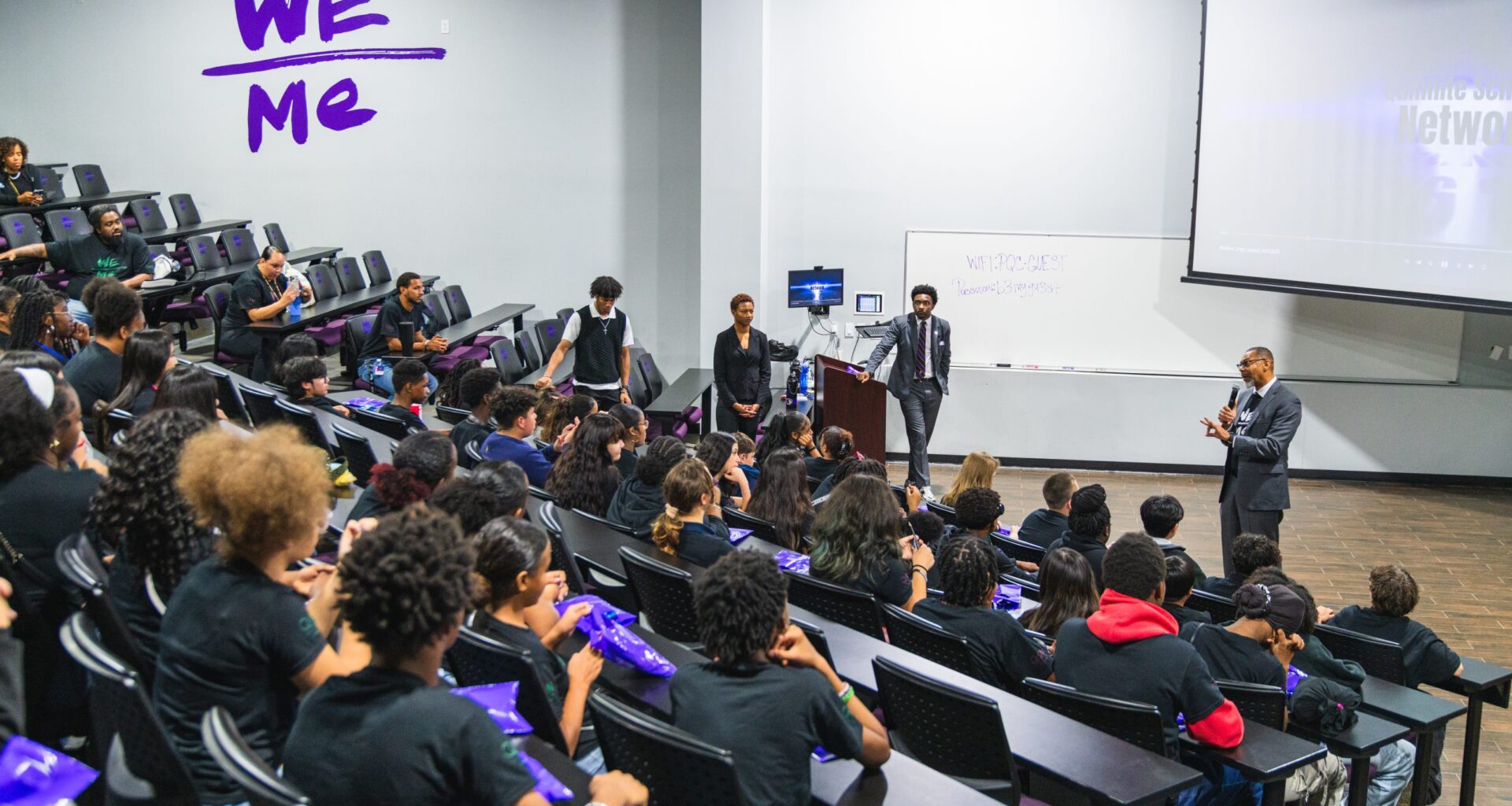Ethan Taylor recently attended his first class at Paul Quinn College in Dallas.
He isn’t a college student. He isn’t even a high schooler. He’s an eighth grader at Summer Creek Middle School in Crowley.
The experience was eye opening.
“I’m very excited for college,” the 13-year-old said. “It’s more advanced stuff. I just want to learn more about everything.”
Realizations such as Ethan’s is the goal of a new three-year partnership between Crowley ISD and Paul Quinn. Since August, the college has run day-to-day operations at the district’s four middle schools to prepare students earlier for college and careers.
But the Quinnite Schools Network does more than ensure students earn their high school diploma, Crowley ISD Superintendent Michael McFarland said.
“It’s about making sure that students have choices and opportunities in life,” he said.
Partnership brings new cash, restructured campuses
Crowley ISD and Paul Quinn work together under a Texas law that provides more state dollars when an outside entity manages daily operations at a school for either academic turnaround or innovation.
Crowley receives more than $3.6 million in new funding from the state because of the partnership. Administrators hired additional counselors and social-and-emotional support staff with those dollars.
On top of that, district leaders revamped each school’s leadership.
The law pauses some consequences for participating Texas campuses that have failed academic accountability standards.
Crowley Middle School received an F in the latest state academic accountability ratings. Summer Creek Middle School has a D, while H.F. Stevens and Richard J. Allie Middle Schools are C’s.
Last year, McFarland pitched the partnership for innovation and as a way to slingshot academic performance.
The entire school day was reworked with 90 minute periods for math and English classes as well as adding in advisory periods to connect students with the idea of higher education.
Paul Quinn, a historically Black college about an hour east of Crowley, expands its career-focused education that provides training and resources beyond its around 600 students.
The goal? Ensure more than 3,500 middle schoolers are ready for college, McFarland said.
Eventually, McFarland envisions Paul Quinn students tutoring middle schoolers and offering the college’s adult education program to parents.
“The opportunities are just wide open,” the superintendent said.
Middle school important for future success
Antonio Mauldin strode across Paul Quinn’s lecture hall floor. More than 30 Crowley middle schoolers listened as he talked about the school when he stopped to emphasize a point to the history honor students.
They needed a 3.0 GPA. At least.
Murmuring filled the auditorium. The students didn’t realize the impact of their grades on opportunities to go to college.
Mauldin, an admissions coordinator, explained how their grades next year as freshmen will impact their senior year — and beyond.
“Take it seriously,” Mauldin said.
High school is too late for students to start planning for college, said Natalie Young Williams, president and CEO of the Tarrant To & Through Partnership. Decisions for a student’s future must be made in middle school to best prepare them for their path.
For example, early college high schools require students to take Algebra I in eighth grade. That means students and parents picking the right classes for their future high schools — and even colleges — in sixth and seventh grades.
“Middle school is a very pivotal stage in a student’s journey, and most people don’t think that designing your future begins in middle school,” Williams said.
Neither does college acceptance, but Paul Quinn already accepted all middle schoolers in the network.
‘See themselves here’
Paul Quinn leaders guaranteed the students the automatic admission to change perceptions on college for families and make the path to higher education feasible.
Upward of 75% of students at Crowley ISD’s middle schools come from low-income families.
A little more than a third of adults 25 and older residing in the school district have at least a bachelor’s degree, according to the U.S. Census Bureau.
The fastest growing demographic in Crowley ISD is Black students, the superintendent said.
Partnering with an HBCU — historically Black colleges and universities — was a strategic move because these colleges know how to forge paths toward opportunity for students, McFarland said. The college also acts as a mirror for students.
“It’s important for them to see themselves at these universities and to see that it is possible, that it’s more than possible. It’s probable when they do these things,” McFarland said.
‘How college works’
Eighth grader Ean Taylor listened to a lesson about the nation’s founding.
Ean was fascinated, even though he was certain he learned about this history in another grade. But he also received a different lesson.
“I got an insight about how college works,” Ean said.
Ean and his twin brother, Ethan, have visited two other colleges. They stomped around Southern Methodist University. They toured Tarrant County College.
Ean and Ethan have their college plans down.
Ethan loves working with kids. He has narrowed down career possibilities to either an art teacher or pediatrician.
Ean loves to argue, a skill he picked up quarreling with his siblings. So, he plans to become a lawyer.
“I want to help lives,” Ean said.
Their other classmates aren’t as sure.
In the lecture hall, Mauldin asked what the students want to be when they grow up.
Lawyer.
Doctor.
A nurse who also sells homes.
Other students remained quiet. Mauldin looked at the students and smiled.
“You can be whatever you want to be,” the admissions coordinator said. “Don’t put yourself in a box.”
Jacob Sanchez is education editor for the Fort Worth Report. Contact him at jacob.sanchez@fortworthreport.org or @_jacob_sanchez.
At the Fort Worth Report, news decisions are made independently of our board members and financial supporters. Read more about our editorial independence policy here.
Related
Fort Worth Report is certified by the Journalism Trust Initiative for adhering to standards for ethical journalism.
Republish This Story
Republishing is free for noncommercial entities. Commercial entities are prohibited without a licensing agreement. Contact us for details.

